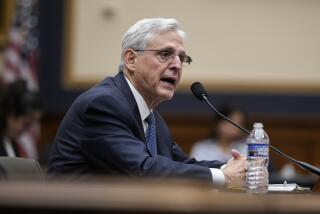In Rare Retreat, Dingell Clears Investigator : Panel Chairman Tersely Ends Threat of Clash
- Share via
WASHINGTON — Rep. John D. Dingell (D-Mich.), the fearsome chairman of a House investigative subcommittee, beat a rare retreat Tuesday and publicly exonerated a private investigator whom he had accused of trying to pass himself off as an agent of the subcommittee.
The investigator, John C. Gibbons of Kroll Associates, an international investigating firm with corporate clients worldwide, was “acting in good faith,” Dingell said in a prepared statement after an abbreviated hearing of his Energy and Commerce subcommittee on oversight and investigations.
“I do not believe any further inquiry into your conduct is warranted,” Dingell told Gibbons.
Dingell’s statement, part of a meticulously orchestrated settlement, appeared to close what had threatened to become an all-out clash between one of the most powerful and strong-willed chairmen on Capitol Hill and a firm that has served as the agent of some of the nation’s most prestigious corporations.
At a hearing a week ago, Dingell raised allegations that Gibbons claimed last year to be working for the subcommittee in seeking information about a principal player in the 1985 takeover of Pacific Lumber Co. by an affiliate of Maxxam Group of Houston. Part of the financing for the takeover was raised by Drexel Burnham Lambert.
The allegations were made by Brian McTigue, one of a dozen investigators on Dingell’s subcommittee staff, and William G. Bertain, a Eureka, Calif., lawyer who last October filed a $2.25-billion class-action suit against Drexel and Maxxam on behalf of former stockholders in Pacific Lumber.
Presented Evidence
McTigue was removed from the investigation last week when it was disclosed that the chief evidence against Gibbons was a surreptitious tape recording of a private conversation between Gibbons and Bertain. The recording was made by Bertain, in apparent violation of California law, on instructions from McTigue.
Gibbons, other Kroll associates and their lawyers had been in close negotiation with Dingell aides since late last week, presenting them documents and other evidence supporting Gibbons’ version of what happened: that McTigue telephoned Gibbons twice last summer, seeking Kroll help in tracing some Wall Street stock transactions.
Dingell aides also conceded late Tuesday that three documents distributed to reporters last week by the subcommittee to buttress the charge against Gibbons had been typed months after the dates appearing at the tops of the memos.
The aides insisted the memos were nevertheless genuine. The original memos, concerning contacts between McTigue and Kroll investigators, were written last summer immediately after the contacts, the aides said, and were merely retyped on new congressional letterheads this year.
Before Tuesday’s subcommittee hearing, representatives of Dingell and Kroll reached an agreement choreographing the settlement of the dispute at Tuesday’s subcommittee hearing:
* Gibbons presented his account of his conduct publicly at the hearing.
* Dingell, without any rebuttal evidence in the subcommittee’s possession, made no attempt to impeach his statement.
* Dingell, in a statement agreed to by both sides, declared that the accusations against Gibbons would be dropped and that the matter would be closed.
Dingell’s actual words were:
“We have received your testimony and reviewed the evidence you have presented to date. As you know, it is not always in harmony with our evidence. I have reached the conclusion that we may never be able to resolve those conflicts. One conclusion I am able to draw from your testimony is that you were acting in good faith. I do not believe that any further inquiry into your conduct is warranted.”
Committee aides emphasized to reporters that Dingell never actually apologized for his subcommittee’s accusations against Gibbons, though his statement was probably as close to a public apology as any the chairman has ever made.
At the same time Gibbons, a former federal prosecutor and U.S. attorney in San Francisco, declared after the hearing that he considered his good name “restored” and his own integrity “vindicated.”
Gibbons said he had been telephoned last July or August by a member of Dingell’s staff--whom he believes was McTigue--asking if Kroll was capable of confirming stock trades and that he had told Bertain of the call.
McTigue, the subcommittee’s chief investigator in the Drexel probe, told the Associated Press late Tuesday that he never made such a call. And other subcommittee officials said a check of the committee’s phone records plus those for McTigue’s home phone turned up no such call.
More to Read
Get the L.A. Times Politics newsletter
Deeply reported insights into legislation, politics and policy from Sacramento, Washington and beyond. In your inbox three times per week.
You may occasionally receive promotional content from the Los Angeles Times.










